HOME >> CHINA
Xinjiang photo exhibition and narratives of insiders
Source:Global Times Published: 2014-7-6 19:38:01
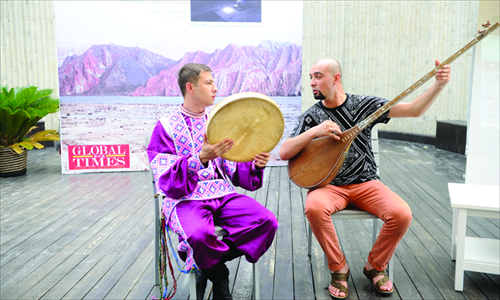
Uyghur musicians perform at the photo exhibition Xinjiang, an Untold Story, hosted by the Global Times in Beijing on July 4. Photo: Li Hao/GT
Editor's Note:The Global Times hosted the photo exhibition Xinjiang, an Untold Story last Friday and invited Uyghur and other guest speakers to the event to tell their stories, with two dozen diplomats and reporters from leading news media from home and abroad in attendance. Since the July 5 riot in 2009, in which many Han as well as Uyghurs were killed in Urumqi, the public has been getting reports from the media about terrorism acts. People might have formed stereotypes about Uyghur people. The Global Times hopes to build understanding between the general public and the Xinjiangers, to present a more complete picture of the region.
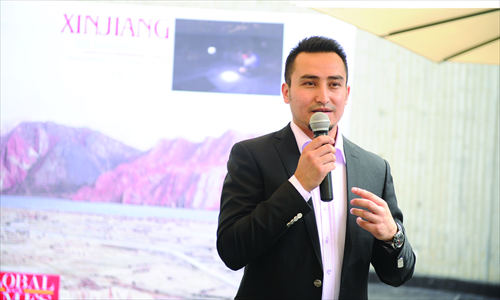
Kurbanjan Samat, photographer and documentary filmmaker
Kurbanjan SamatPhotographer and documentary filmmaker
Photos can give a true picture of Xinjiang. My father was recently ill and received surgery in a hospital in Urumqi. I spent a week taking care of him there. During that period, using my mobile phone, I chose a spot in the hospital and captured a series photos of people waiting at the same place over time. Whether they were Uyghur, Han, Hui or Kazak, all of them shared a similar wish, to live a healthy life. This is a true national unity.
I've interviewed about 120 people and got in touch with about 400. Some of these people match the stereotypes the public may have of Xinjiang, people who sell barbeque, pancakes, fruits, or own restaurants. Others are white-collar workers, managers, and government civil servants.
Within half a year, I felt like I went through college again. I saw my past in every interviewee's story, and am inspired by their stories. Everybody met different difficulties. These problems actually don't exist because of their ethnicity, but are rather questions that arise as the country and society develop.
But what touched me is nobody complained or became extreme because of these issues, they all showed understanding. This is what I and every interviewee want this society to see, every Xinjianger is growing as the country is developing, everybody is working hard and hoping to live in a peaceful and harmonious society, to live for our dreams, our goals and for a better livelihood.
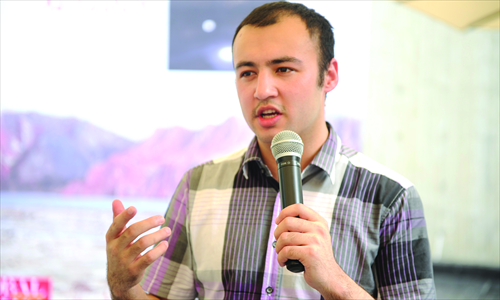
Eliyar Eziz, assistant secretary general of Tree of Love, which helps children in Xinjiang
Eliyar EzizAssistant secretary general of Tree of Love, which helps children in Xinjiang
There has never been a charity organization that serves the children in Xinjiang. We wanted to fill that void and registered one. Right now we are working on shooting very short films about children in Xinjiang and donating winter clothes to poor areas in Xinjiang. We were trained by a US-based organization that provides aid to schools, and have started a financial aid program for school children in Xinjiang as well.
At first, I thought the financial aid could only help the children for a couple of years. I wondered whether it could change their lives, help them go to college and escape from poverty-stricken areas until one day I talked with another charity worker. She told me that through our help, the children who would've dropped out after middle school made it through high school and started their lives at a higher level. They have a different education and way of thinking than before.
They don't have to be college students or become high government officials, but they can be better parents and better raise their children. The local education level can slowly increase that way. There might be better future outcomes because of our help, so we don't have to ask for too much. And this is why I've persisted this long on the project.
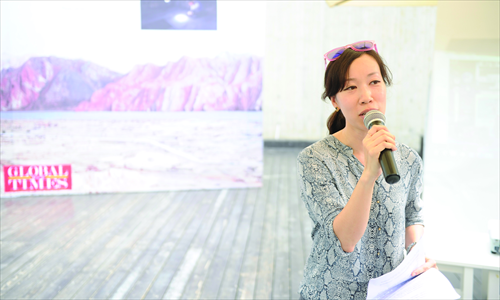
Lin Meilian, Global Times reporter
Lin MeilianGlobal Times reporter
The Uyghurs are very open, good at singing, playing guitar and dancing. Some Uyghur youth play guitars and sing quietly at late night. Some Uyghurs even carry guitars on their backs and play as they drink and eat barbeque. Once I was eating with some Uyghurs, who started singing and dancing in the middle of the meal. In some ways, they're open, simple and happy. They are not restricted in what they do and what they say.
The first time I went to Xinjiang was a year after the July 5 incident in 2009. Back then, Urumqi was divided by an invisible line into south and north. The Han are in the north and the Uyghurs in the south. I was the only Han on the streets around the bazaar area in the south and the Uyghurs looked at me curiously. Even the taxi driver wouldn't drop me off where Uyghurs gathered. But there were policemen patrolling all over the streets.
Every Xinjiang story has three versions, the Uyghur version, the Han version, and the true version. I hope everybody can go to Xinjiang and see for themselves their own versions of the story.
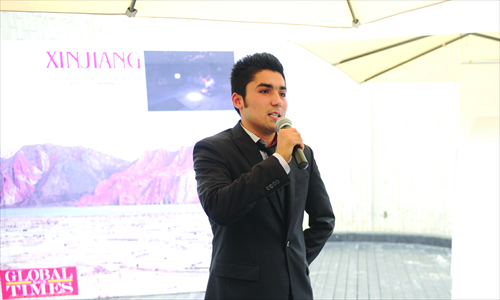
Abdulhabir Muhammad, chief operating officer of Beijing Hold International Educational Consulting, a startup that provides services to young people wanting to study abroad
Abdulhabir MuhammadChief operating officer of Beijing Hold International Educational Consulting, a startup that provides services to young people wanting to study abroad
I'm from a village in the Aksu prefecture in Xinjiang. In my hometown, if you don't work hard you can only be a farmer when you grow up.
The people in our region are very poor. We aren't afraid of poor parents. We are just afraid if you are poor, you can't set an example to your children.
Our educational fund provides scholarships to graduate students from our region. If they want to obtain a master's degree, we will provide all the tuition, that's our dream. If there was a fund like this in every city in the country, the education in not just Xinjiang but the whole world could be improved.
As for me, I hope more people can go abroad through the help of our educational fund. If someone's hungry, you buy him a meal, but he will still be hungry the next day.
But if you help them through education, this help will last.
We want the world to see that we are more than just barbeque street vendors.
There are many elites from Xinjiang, who are working in investment banks, information technology, sports and international trade. We want the world to see a different Uyghur generation.
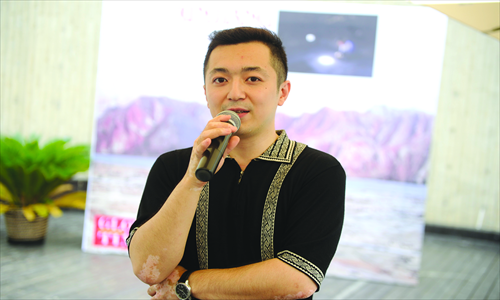
Alip Yakup, owner of public account on Weibo, "Xinjianger in Beijing," which introduces Xinjiang to the public
Alip YakupOwner of public account on Weibo, "Xinjianger in Beijing," which introduces Xinjiang to the public
I wanted to do something for my home, and I have found Weibo a powerful platform to spread Xinjiang's scenery and culture. People outside of Xinjiang tend to have misunderstandings about the region and can only get to know the region through TV reports. It's hard for them to meet people from Xinjiang. We hope to help people understand Xinjiang better this way.
Many of my friends from Xinjiang who are working in big cities introduce information about their home to others, just as I am doing. But I also want to ask, why are we doing the work? It should've been done by the media.
I was disappointed after the July 5 incident. Many people paid attention to Xinjiang and there were many reports at first. But after a couple of months, people's attention was diverted to other matters, because there were hardly any in-depth reports about Xinjiang. We hope there can be more complete reports on Xinjiang, about all dimensions, such as Uyghurs who live in cities, who have modern lives. Not just reports on ethnic culture.
When I get off work, I write a few Weibo posts about Xinjiang. And some friends can't imagine that's what Xinjiang is like. Their whole knowledge of the region comes from others. I hope the media will report about Xinjiang in more in-depth ways. One-sided reports can only increase the bias people outside the region will have.
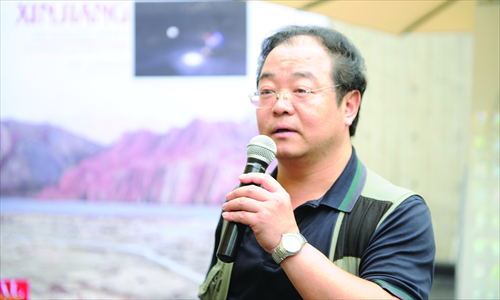
Yao Sicheng, photographer
Yao SichengPhotographer
Xinjiang is a beautiful place, in terms of its scenery, culture and its long history. It impressed photographers like us deeply.
As photographers, we look at Xinjiang with an outsider's eyes and we hope we can be granted the opportunity of photographing Xinjiang's beauty in more thorough ways.
While we were shooting, we also got in touch with an enthusiastic and friendly group of people.
So as photographers, we hope there can be locally organized trips to capture Xinjiang's culture and scenery on film for better publicity.
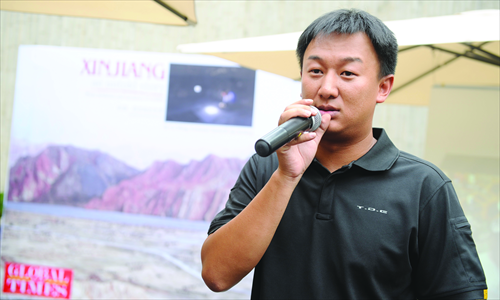
Cui Meng, Global Times photographer
Cui MengGlobal Times photographer
One night [a policeman I photographed in Urumqi during a reporting trip] came to me around 2 am and asked whether he could have a talk with me. I said yes. Then he drove me miles outside the city, up a hill, parked the car and started telling me his story, nonstop for two hours. He told me how stressful his job was, saying he's working all the time. His wife is pregnant, but he has asked her to bring his uniform on the day of labor [as a memento to remind her of him], in case he can't make it due to work. "I only wanted to get those words out, because they've been bottled inside for so long," he told me.
He's only one representative of the policemen in Xinjiang. There are also many of them in the south of Xinjiang, where many terrorism attacks happened. Suddenly I felt more secure.
After I came back to Beijing, many people asked me whether I was scared in Xinjiang. I always told them that there's a group of people there who are sticking to their own posts, to make sure people in all ethnic groups are safe. I feel that Xinjiang is safe, because I have faith in them.
Posted in: In-Depth